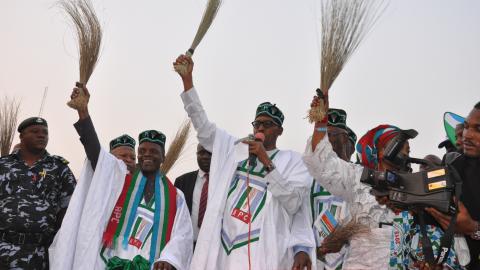Nigeria’s controversial president, Mohammadu Buhari, faces the end of his term of office in May 2023. With that on the calendar, the country’s presidential election took place on February 25 and 26. As Africa’s most populous country, Nigerian voters had the choice of more than a dozen contenders, three leading candidates represented their competing parties on the ballot: Atiku Abubakar, 76, ran on behalf of the primary opposition, the People’s Democratic Party (PDP). Peter Obi, 61, represented the little-known Labour Party (lighting a brief spark of optimism among Nigeria’s younger generations). And Buhari’s heir-apparent Bola Ahmed Tinubu, 70, was offered by the All Progressives Congress (APC).
In a perfect world, elections would be fair and conclusive. But many international observers see Nigeria as a tragically corrupt nation. And it comes as no surprise that that the Nigerian population deeply mistrusts its government — especially when elections roll around. So by Tuesday, according to a New York Times report, voters were already demanding an election rerun. And two of the three leading parties — Labour and the PDP — claim the election was “rigged” and otherwise compromised — unsurprisingly in favor of Buhari’s ruling party.
At the time voters went to the polls, 93.5 million Nigerians were registered voters. And members of the two leading political opposition parties hopefully — if futilely — voted against APC’s Tinubu. Of course, they were quick to oppose the election results. And by Tuesday, they claimed that votes were “being taken to government houses for manipulation” before being released, and that “election officials had not been submitting images of the result sheets from polling stations, as had been the plan.”
The Times described the distress that infuriated so many voters: “Under Mr. Buhari’s leadership, the Giant of Africa, as Nigeria is known, lurched from one economic shock to the next. Over 60 percent of people live in poverty, while security crises — including kidnapping, terrorism, militancy in oil-rich areas and clashes between herdsmen and farmers — have multiplied.”
Meanwhile, for those of us who focus on international religious freedom, those are very real concerns — but not our only ones. We have long protested the fact that Islamist President Buhari and his Fulani government have turned a blind eye toward anti-Christian terrorism. Under his rule, more than 4,000 Christians were murdered in Nigeria in 2022 alone. As the Christian Post reported:
“Fulani herdsmen and Islamic terror groups allied with it were responsible for 2,650 of the 4,020 Christian deaths between January and October. …The other terror groups, including Islamic State in West Africa Province, Boko Haram and Ansaru, accounted for 450 Christian deaths and the Fulani (Zamfara) bandits and their splinter groups were responsible for 370 Christian deaths, it added.”
Likewise, Open Doors wrote that in 2021, “… more Christians were murdered for their faith in Nigeria than in any other country. Last year, Nigeria accounted for nearly 80% of Christian deaths worldwide. …The death toll once again makes Nigeria the world’s most violent place for Christians.”
Christian persecution in Nigeria has been reported for decades. And thankfully, the Trump administration made some efforts to address the country’s chronic and violent abuses. As The Washington Stand recently noted, “In December 2020, then-Secretary of State of Mike Pompeo designated Nigeria a Country of Particular Concern (CPC), thus providing legal opportunities for specific measures against President Muhammadu Buhari and his government. Religious freedom advocates and some U.S. lawmakers applauded the designation with relief, gratitude, and hope. Yet, less than a year later, in November 2021, with no explanation whatsoever, the Biden administration abruptly removed Nigeria’s CPC designation. This delisting amounted to a license for ongoing violence and an outrageous betrayal of Nigeria's increasingly brutalized Christians.”
Still, tragically, no progress has been made in addressing Nigeria’s Christian bloodshed. Instead, the hope many believers held for a better future following this election has been shattered.
In an email, one Nigerian friend wrote to FRC, “The eyes of Nigerians were on the opposing parties as the emerging winners of the election. But overnight it changed; it turned out that things happened which were not in the interest of Nigerians; we quickly saw the rigging of the election results. …There are no well-meaning Nigerians who are happy with what is going on right here with the election. The ruling Muslim government has their own interests, and their choices are being imposed against the mass’s will.”
No doubt frustration and anger will continue to surge following this week’s election results. During these difficult days, let’s offer special prayers for Nigeria and especially for its Christian community — appealing to God for justice, protection, and restored hope. Let’s also remember Nigerian schoolgirl Leah Sharibu, who was kidnapped on February 19, 2018. Leah has now been held captive by terrorists for more than five years — all because of her refusal to renounce her Christian faith. May the Lord have mercy on her and on all Nigeria’s endangered believers. They comprise nearly 50% of their troubled country’s population. They urgently need our prayers.















